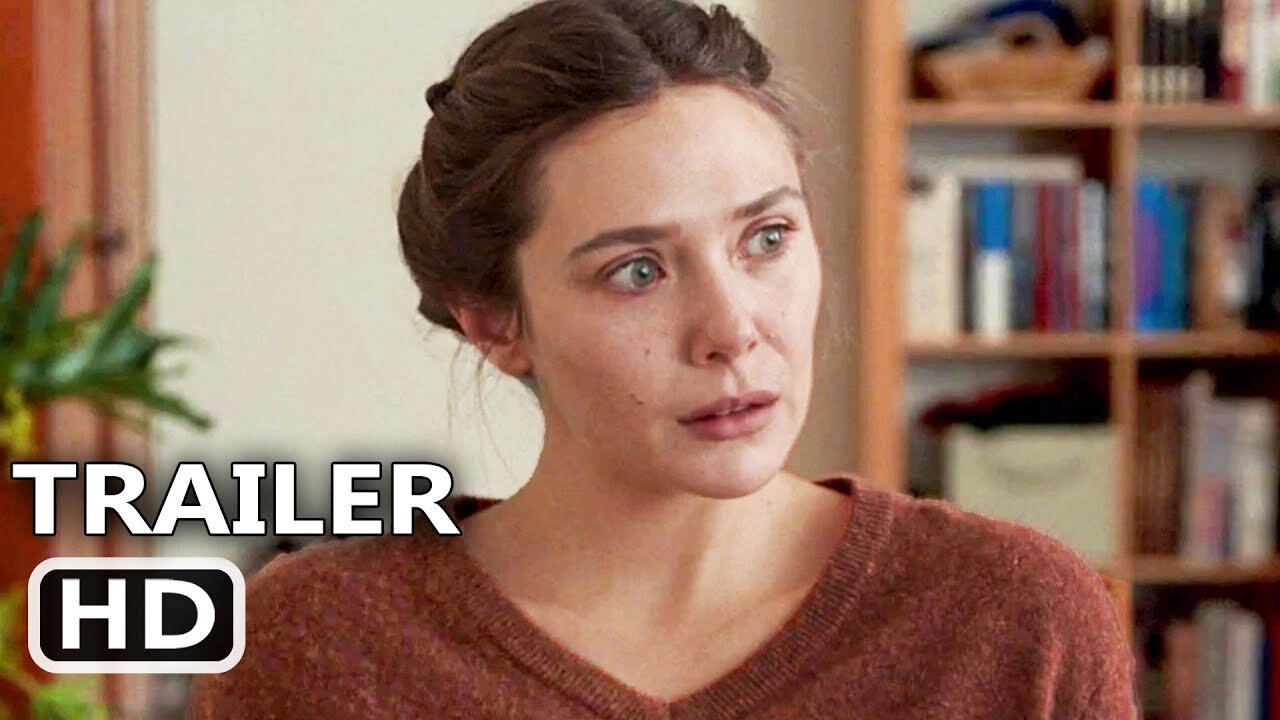Premium Only Content

HIS THREE DAUGHTERS Trailer (2024) Elizabeth Olsen, Natasha Lyonne, Carrie Coon
HIS THREE DAUGHTERS Trailer (2024) Elizabeth Olsen, Natasha Lyonne, Carrie Coon
HIS THREE DAUGHTERS Trailer (2024) Elizabeth Olsen, Natasha Lyonne, Carrie Coon
© 2024 - Netflix
Natasha Lyonne, Carrie Coon, and Elizabeth Olsen are coming home to their respective indie roots for grieving family drama “His Three Daughters.” The trio play the eponymous siblings for the Netflix film, which debuted at TIFF 2023. Coon stars as responsible sister Katie, who is tasked with carrying out her ailing father’s (Jay O. Sanders) end-of-life wishes. Olsen is her sister Christina who embraces the spiritual realm to cope with losing her dad, while Lyonne’s Rachel opts to smoke pot and disassociate.
The three estranged sisters come together once more to a New York apartment to care for their dying father and “try to mend their own broken relationship with one another,” per the film’s official synopsis.
Related Stories
Deadpool and Wolverine
Former Marvel EIC Roy Thomas: ‘There’s No Such Thing as Superhero Film Fatigue’ — Just Bad Movies
Kevin Costner in 'Horizon'
Kevin Costner’s ‘Horizon’ Chapter 2 to Premiere at Venice
Azazel Jacobs writes and directs the film, which IndieWire’s Kate Erbland gave a B+ review. Jacobs’ previous features include “French Exit” and “The Lovers,” as well as the series “Sorry for Your Loss” which also starred Olsen.
“Jacobs’ stellar casting instantly belies the care that goes into the entire film, and as he allows each of his stars to further melt into their roles, ‘His Three Daughters’ doesn’t just grow, it grows more generous,” Erbland wrote. “As the sisters — the daughters — start to come together, Jacobs lulls them with a last act bit of wish fulfillment, even fantasy, perhaps delusion. Initially, this twist feels at odds with the wonderfully lived-in, deeply realistic world Jacobs and his stars have built. And yet, it also offers the greatest argument for the strength of their bond. They are different people, main characters of their own story, but they have a shared dream: one in which all of them, all four of them, can be together for one more moment. Family is forever, even if it’s fleeting.”
During a July 2024 Netflix tastemaker screening and Q&A for the film, Jacobs explained his inspiration for the personal feature. “I’ve had experience with close people passing, and it’s only increased as I’ve gotten older, and there’s always been a fear with my own parents,” Jacobs said. “There’s a sense of how time shifted that I was really pursuing that I really hadn’t seen so much in film, how time collapses and expands when you know that something you’re dreading happening is absolutely going to happening, similarly to the way a film is going to end. I was halfway through the first draft when I realized I was just pictured [these actors in the movie].”
Jacobs was also determined to create “an environment I want to escape to” onscreen; “His Three Daughters” is filmed in 35mm by “Lady Bird” and “Frances Ha” cinematographer Sam Levy. “Even though I was dealing with these heavy things, I wanted to be in this world. I wanted to be with these actors. I wanted to be on this set. I wanted to be able to walk to this place from my neighborhood,” he said. “Once we found that apartment, that that courtyard was exactly perfect, that we didn’t have to piece anything together, that the hallway was right, I didn’t need to second guess any of it. It was very clear all the way through, for whatever reason, with this film specifically.”
“His Three Daughters” will arrive in select theaters on Friday, September 6 and will start streaming on Netflix Friday, September 20. Check out the trailer below.
READ MORE:
AZAZEL JACOBS
CARRIE COON
ELIZABETH OLSEN
FILM
HIS THREE DAUGHTERS
NATASHA LYONNE
TRAILERS
On Thursday, Netflix debuted the first trailer for one of its major 2024 awards contenders: Azazel Jacobs’s family drama “His Three Daughters” with Emmy nominees Carrie Coon, Natasha Lyonne, and Elizabeth Olsen starring in the title roles.
Says Netflix in its press release: “This tense, touching, and funny portrait of family dynamics follows three estranged sisters as they converge in a New York apartment to care for their ailing father and try to mend their own broken relationship with one another.”
“His Three Daughters” will debut in limited release starting on September 6 before hitting the streaming platform on September 20. Netflix acquired the film during last year’s Toronto International Film Festival, where “His Three Daughters” received strong reviews for its story execution and revelatory performances – particularly from Lyonne, who plays against her usual type as the half-sister of the characters played by Coon and Olsen.
“I just was very surprised, honestly, to be thought of at this level of a team,” Lyonne said during a tastemaker event Netflix held for “His Three Daughters” earlier this month. “This was, for me, a high level that I don’t often get to play, really across the board. There’s also that scariness of jumping off the cliff. There’s just no place to hide, and nothing to hide behind. It’s like, ‘OK, well, do I really need to play another stoner?’ I don’t really like stoners. I like other types of things. Their stories are kind of slow, they get lost a lot. It was like typecasting essentially, right? Because it was this group, though … and how you [Azazel Jacobs] knew it was us. That sort of specificity is very seductive. Because you’re like, ‘What do you mean, and how do you know?’ This is a business of rejecting, going at big swings, like, ‘First, it’s Demi Moore, Sharon Stone, Viola [Davis]!’ The same four. ‘Like, who are the biggest international stars?’”
During the event, the first time the three actresses had been together for the project since it debuted last year during the prolonged actors’ strike, all three acclaimed performers praised Jacobs’s screenplay.
“With the sense of humor, and the awkwardness, I just don’t think there’s that much good writing out there, frankly,” Coon, an Emmy nominee this year for “The Gilded Age,” said. “There aren’t that many great scripts. There’s a lot of arbitrariness in art, especially if you’re working in TV. ‘Did anybody read this scene?’ Nope, it’s fine, we’ll just do it like that. That’s fine. So it was really nice to have someone have such a specific vision.”
All three stars are expected to compete for awards attention this year, although a final placement decision for Lyonne is still being considered.
Watch the new trailer for “His Three Daughters” below.
PREDICT the 2025 Oscar nominations through January 17
Make your predictions at Gold Derby now. Download our free and easy app for Apple/iPhone devices or Android (Google Play) to compete against legions of other fans plus our experts and editors for best prediction accuracy scores. See our latest prediction champs. Can you top our esteemed leaderboards next? Always remember to keep your predictions updated because they impact our latest racetrack odds, which terrify Hollywood chiefs and stars. Don’t miss the fun. Speak up and share your huffy opinions in our famous forums where 5,000 showbiz leaders lurk every day to track latest awards buzz. Everybody wants to know: What do you think? Who do you predict and why?
when Azazel Jacobs began writing His Three Daughters, he realized he’d created characters with three very specific stars in mind: Carrie Coon, Natasha Lyonne, and Elizabeth Olsen. The filmmaker had a relationship with each of these decorated actors; the roles seemed tailored to each of them, playing to familiar types before digging deep beneath the surface. “They’re still searching for something that they may not have had a chance to express,” Jacobs tells Vanity Fair. “While each of these characters spoke to them, it also felt like something that maybe they hadn’t yet done.”
As teased by the trailer (which you can watch exclusively above), the movie feels different—authentic, spare, suffused with tough love—because it was made that way. A portrait of three estranged sisters at very different stages of life converging under their dying father’s roof for his final days, His Three Daughters is a searing grief drama exactingly realized by Jacobs and enlivened by powerhouse performances. After hand-delivering them scripts, Jacobs promised his cast that he’d make the movie on real locations, that he’d shoot on film, and that every shot would count. And he brought them all deeply into his process.
A guide to Hollywood’s biggest races
“I was reaching back to a certain filmmaking approach that I grew up with and saw a lot of but hadn’t seen recently,” says Jacobs, whose last film was the Michelle Pfeiffer vehicle French Exit. After launching amid noisier premieres at last year’s Toronto International Film Festival, His Three Daughters earned rave reviews, leading to a splashy Netflix pickup and early awards buzz for its main trio of actors. This is truly intimate filmmaking, leaving the actors to introduce established personas before diving into daringly vulnerable places. Lyonne’s wise-cracking detachment will initially feel familiar, for instance, but it takes on a whole new dimension when she breaks your heart.
In their first extensive interviews about His Three Daughters, Coon, Lyonne, and Olsen spoke with Vanity Fair about the singular experience of both making and now sharing the movie. “For me, it’s now been a 40-year career,” Lyonne says, “and I don’t know that I’ve ever seen something like this.”
Interviews for this story have been edited and condensed.
Vanity Fair: Azazel Jacobs wrote each of these roles specifically for you. How did you react to the characters, knowing that?
Natasha Lyonne: It did take me a second to connect with Rachel, ’cause I am so not a pothead. [Laughs] But really, I was like, Is it more interesting if I’m playing Lizzie’s part and a deadhead or something? It was almost confusing. It made me think a little bit, like, Gosh, I really want to do this for Aza, but where is the surprise in me smoking pot? We all think of me as somebody who smokes pot!
But because I let go so completely, I was able to find all of the vulnerability that’s tethered to that: the reasons why I used to smoke so many cigarettes in the first place, or insert-substance-here. I relinquished myself to it. I was able to find all the soft sides of it rather than in something like Russian Doll, where it’s almost like I’m front-facing with the hard edges of it, and the nihilism of it, and the New York of it, and the Lou Reed of it. In this, because it was a family sort of chamber piece, it’s how a person gets to be that way on the outside when you meet them on the street. I come off hard-edged and tough, but it’s only because I’m so soft that I’m wired that way as a coping mechanism from childhood or whatever. It was safe to go there, the why behind all of the smoke that’s always puffing out of me.
Elizabeth Olsen: When we talked about the script for the first time, I said [to Jacobs], “It’s really funny that this is the version of myself that you envision.” I think of myself as kind of direct and demanding, but I do have a nurturing softness to me, and I do act as a mediator often. He knows that part of me as well. I feel like I tapped into a softness that I don’t think I’ve been able to put onscreen before. I was enjoying going back to other films as references. I was thinking about Dianne Wiest in Hannah and Her Sisters, even though she’s a totally different character, but she exudes such softness in everything she does. I was trying to allow that part of myself that Aza, I guess, sees [laughs], but is something I haven’t put on camera.
Carrie Coon: I feel that I often play high-strung controlling moms. [Laughs] It might be a vibe that I give off, which is funny because I’m actually pretty relaxed in my life. Natasha is right in that you kind of read those things and you think, Oh, these are all types. And then as the script unfolds, what you understand is that the form follows the function—the story unfolds in such a way that the audience first encounters the sisters as they’re seeing each other. And then as their point of view gets complicated, so does the audience’s. The audience is actually going on the same journey as the sisters are going on, as they’re rediscovering each other inside of that grief.
The film opens on this unbroken shot of you, Carrie, delivering this very fast monologue. From there, the visual style is very deliberate. Can you talk about working within that?
Coon: Prepping for this felt like prepping for a play. It’s very dialogue-heavy. I knew I was doing the big opening speech, and that I was first up in a room full of heavy hitters. Incredibly intimidating. And I also have two small children, and I don’t have enough time to prepare anymore. [Laughs] These days I always feel underprepared for every job. I was a straight-A student, and there’s just no way that I can live up to my own standards anymore. I swear, I was about to quit the business before this. I was having very serious talks with Tracy [Letts, her husband] about how I didn’t think I could keep being an actor and being a mom at the same time. I felt really overwhelmed by it all. But then this script was so compelling, I knew I had to do it.
With the first scene, I knew Aza wouldn’t move on until he felt it was just right. But it’s so theatrical. Even the way it’s shot, it’s so stark against that white wall. It’s very exposing. There’s not much to rely on. There’s nothing to do with your hands. It really is all about punctuation. The first three lines, I don’t think there’s any period at all. It’s like a run-on sentence.
Lyonne: We shot it all in that apartment. I’d walk back home with [cinematographer] Sam [Levy], show back up the next day, and then we did rehearsals in that same apartment. The danger of acting is no false moves. You can smell a lie onscreen. But if you are genuinely settled in the space, you’re able to fully embody something. It also really opens the prism or aperture of what you can do, because no comedic moment is without drama, and no dramatic moment is without the full scope of human emotion, especially in a piece like this that’s about family, mortality, friendship, and the sisterhood—it’s tackling such sweeping themes that, every moment, all things are on the table and come to the surface. It’s really fun to work in that way.
Olsen: There was no place to hide. Anytime we had to do a quick setup change, we would all just shuffle around each other. Our sound mixer was always in our father’s room. Restrictions are exciting creatively because they allow for you to have to really be specific with the space and the time you have. There’s an energy to having the limits that makes you have to really problem-solve as effectively as possible.
Coon: I think only three quarters of the way through the movie, in the dinner scene, is the first time you see us all in the same frame. Aza and Sam would argue a little bit over how to shoot it because the constraints of the space were so extreme. You can’t take out a wall. It was really challenging. We had Jovan [Adepo] and Rudy [Galvan] and Jasmine [Bracey] intruding on our space, and it really felt like a violation to have them there, in the best way. We were mirroring what was happening in the story.
Olsen: And you’re not quite sure where you are, or oriented in the space, until the relationships grow and shift with the sisters. They’re just incredibly isolated.
Given that intimacy, how did you find working together and getting to know each other?
Coon: Lizzie is so effortless, and Natasha is so relentless in pursuit of the truth, and you just can’t help but feel like the weakest link whenever you’re in the room. But again, by virtue of the fact that we signed on to do the movie, we all knew we were going to come in super prepared. That’s who we are. We’re just ready to roll up our sleeves and do the work. We were also crammed into this tiny space. We were literally on top of each other.
By day three, we were basically just sitting on each other’s laps in there, trying to make Queen Bee in the New York Times [Spelling Bee]. That’s how we bonded. Aza would say, “Hurry up and make Queen Bee, because we have to get this scene before the end of the day!” We were in these little dressing rooms in this rent-controlled apartment building, hanging out all day long, and it was delightful.
Olsen: All three of us as actors really show up from a very open, honest place, knowing that there’s no time to have too many boundaries. [Laughs] We said yes to this project, we all understood the rules and the restrictions of it, and we were all here to play. We all fell in love with each other very quickly.
Coon: Elizabeth Olsen has done such interesting work, and I think we haven’t even touched what she’s capable of yet. I feel like her moment hasn’t even arrived yet, because she’s young—and so, so talented. I can’t wait to see what happens to Elizabeth 10 years from now. And I feel like we were bumping into Natasha at the apex of her career, firing on all cylinders—as a director, as a producer, as an actress—and has had this incredible second lease on her life, having been an addict. Because she’s very open about her journey through life, and the fact that she’s alive is a bit miraculous, and I feel like she lives that way. She’s one of the smartest people I’ve ever met.
The movie premiered in Toronto without any of you in attendance, given that it happened during the SAG-AFTRA strike. Was it strange, observing it from a distance? How did it feel seeing it resonate?
Coon: I haven’t seen the movie yet. The rough cut I saw was on a laptop, so I haven’t actually experienced the film, even though I’m doing press for it. I feel really alienated from that moment in Toronto.
Lyonne: It’s a testament to the movie itself that, despite not being able to do the usual steps and promotion, the work stood on its own—and it rose. It actually was very keeping in line with the experience of making the film.
It hearkened back to something more meaningful, a time when the arts were actually just about making a piece of work from the heart rather than being concerned with how it was received or expectations or box office or packaging or marketing. So many of those ideas have so thoroughly corrupted us as people, let alone an industry. Just the way that we commodify everything has really ruined us in so many ways. In a way, Toronto was almost like the perfect vehicle for it, in that there were no beautiful actresses in the mirror. No gorgeous designer dresses and all that fanfare. It is simple: one heart catching another.
Coon: Aza Jacobs is a very specific filmmaker. I feel that if you were given a pile of films and nobody told you who made them, you would probably be able to pick his out, right? You’d say, “These three were made by the same person.” I mean that as a compliment. His vocabulary is very strong and very specific, and he hasn’t historically been for everyone. So the shocking thing for me was how much people resonated with this particular film, because it’s very much an Azazel Jacobs film. It doesn’t exist that far outside of his oeuvre, and yet the world embraced it in such a way that it’s clear he put his finger on the pulse of something in the grief, in the lack of sentimentality in dealing with that grief. I was really surprised how it was received in the world, if I could be frank. I mean, incredibly gratified. I didn’t expect it.
His Three Daughters will be released in US theaters on September 6 before hitting Netflix on September 20. This feature is part of Awards Insider’s exclusive fall film coverage, featuring first looks and in-depth interviews with some of this coming season’s biggest contenders.
Listen to Vanity Fair’s Little Gold Men podcast now.
More Great Stories From Vanity Fair
Inside Kamala Harris’s Loyal Circle of Hollywood Friends
The “Big Weirdo” Political Strategy That Democrats Are Using to Taunt Republicans
The Untold Stories of Humphrey Bogart’s Volatile Life
The Truth About Meghan, Harry, and Their California Dream
California’s Freedom-Loving, Bible-Thumping Hub of Hard Tech
The Best TV Shows of 2024, So Far
Listen Now: VF’s Still Watching Podcast Dissects House of the Dragon
Between “Terri” (2011), “The Lovers” (2017), “and “French Exit” (2020), not to mention the series “Doll & Em,” filmmaker Azazel Jacobs has continuously delivered compelling human dramas. He returns with his first film in four years, “His Three Daughters.” Premiering at the Toronto International Film Festival in 2023—our review described it as “riveting”—Netflix, who acquired North American rights to the poignant drama last year, is finally releasing the film in September (read our review here).
And there’s a terrific pair at its center: Carrie Coon, Elizabeth Olsen, and Natasha Lyonne star as the three sisters in question, who come home to tend to their ailing fathers, trying to heal old family wounds in the process.
READ MORE: Summer Movie Preview: 50 Must-See Films To Watch
Jacobs also wrote the script and the film stars Jovan Adepo, Jay O. Sanders, Rudy Galvan, Jose Febus, and Jasmine Bracey.
Here’s the Netflix synopsis:
This tense, touching, and funny portrait of family dynamics follows three estranged sisters as they converge in a New York apartment to care for their ailing father and try to mend their own broken relationship with one another.
Here’s TIFF’s synopsis, which reveals a little bit more.
When their father’s health worsens, three estranged sisters come together to try to plan for the inevitable. The eldest is high-strung Katie (Carrie Coon), who talks a hundred miles a minute and stresses about all the practical details. The middle sister, Rachel (Natasha Lyonne), is ready to check out after spending a year taking care of the man. And the youngest sibling, Christina (Elizabeth Olsen), seems always on the verge of tears, trying her best to clumsily keep the peace while they’re all stuck in their father’s small apartment.
“Three Daughters” will be released by Netflix in select theaters on Friday, September 6th, 2024, and streams on Netflix on Friday, September 20th, 2024. Watch the first trailer below.
Azazel JacobsCarrie Coon. Natasha LyonneElizabeth OlsenNetflixThree Daughters
-
 2:12:46
2:12:46
Price of Reason
1 day agoAmber Heard BACKS Blake Lively Lawsuit Against Justin Baldoni! Is Disney CEO Bob Iger in TROUBLE?
65.1K24 -
 1:01:17
1:01:17
The StoneZONE with Roger Stone
19 hours agoChristmas Edition: Why the Panama Canal is Part of the America First Agenda | The StoneZONE
135K50 -
 18:12:15
18:12:15
LFA TV
1 day agoLFA TV CHRISTMAS EVE REPLAY
148K19 -
 13:32
13:32
Scammer Payback
21 hours agoChanging the Scammer's Desktop Background to his Location
16.8K4 -
 4:21
4:21
BIG NEM
23 hours agoNikola Tesla's Secret to Cultivating Creativity & Genius
12.5K1 -
 15:03
15:03
The Anthony Rogers Show
1 day agoAnthony Rogers - Live at Cusumano's Pizza (Upstairs)
9.98K1 -
 4:33:48
4:33:48
tacetmort3m
1 day ago🔴 LIVE - THE ZONE KEEPS PULLING ME BACK - STALKER 2 - PART 15
75K13 -
 22:45
22:45
Brewzle
1 day agoI Went Drinking In A Real Bourbon Castle
53.8K4 -
 48:36
48:36
PMG
2 days ago $5.14 earned"Parkland Parent Speaks Out On Kamala Harris Using Victims"
43.5K12 -
 4:06
4:06
The Lou Holtz Show
1 day agoCoach Lou Holtz’s Heartfelt Christmas Message 🎄 | Family, Faith & Notre Dame Spirit 💚 #christmas
31.6K1